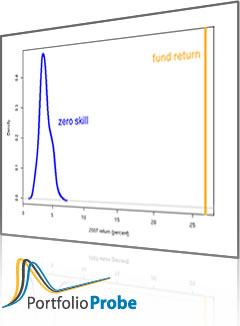Follow us using:
Newsletter Sign-up
Category Archives: Blog
Investment performance: measurement versus calculation
I recently had a frustrating — for both parties — conversation involving performance measurement. I said “measurement”. My dialogist heard “calculation” but wanted “measurement”. We went dizzy in the chase. Calculation and Measurement What’s the difference? A calculation is what computers do. A measurement is an assessment. It is a comparison with an ulterior motive. I’m … Continue reading
Popular posts 2013 October
Most popular posts in 2013 October On smart beta The look of verifying data Quant finance blogs A practical introduction to garch modeling (posted in 2012) The top 7 portfolio optimization problems (posted in 2012) Four moments of portfolios A tale of two returns (posted in 2010) The number 1 novice quant mistake (posted in 2011) Miles of iles (posted … Continue reading
Posted in Blog
Leave a comment
An interview regarding social impact bonds
An interview with Russ Bubley: Russ is the founder of i for change, a social investment strategy consultancy working with charities, social enterprises, government and investor groups to bring innovative capital markets solutions to social and environmental problems. Pat: The last time I saw you in person you were doing risk management. How did you … Continue reading
Quant finance blogs
What I’ve learned from updating the blogroll. New entries The easy option is to go to The Whole Street which aggregates lots of quant finance blogs. Somehow Bookstaber missed out being on the blogroll before — definitely an oversight. Timely Portfolio was another that I was surprised wasn’t already there. The R Trader talks about … Continue reading
Posted in Quant finance, R language
7 Comments
Four moments of portfolios
What good are the skewness and kurtosis of portfolios? Previously The post “Cross-sectional skewness and kurtosis: stocks and portfolios” looked at skewness and kurtosis in portfolios. The key difference between that post and this one is what distribution is being looked at. The previous post specified a single time and looked at the distribution across … Continue reading
The look of verifying data
Get data that fit before you fit data. Why verify? Garbage in, garbage out. How to verify The example data used here is daily (adjusted) prices of stocks. By some magic that I’m yet to fathom, market data can be wondrously wrong even without the benefit of the possibility of transcription errors. It doesn’t seem … Continue reading
Posted in Quant finance, R language
Tagged data errors, data verification, missed stock split
9 Comments
On smart beta
A bit of perspective on a buzzword. The prompt The Axioma Quant Forum in London included a discussion of smart beta. I took two highlights from it: a point of view and a question. The point of view was stated by Gerben de Zwart: “Smart beta seems like a replay of simple quant strategies of the … Continue reading
Review of “Governance Reimagined” by David Koenig
The subtitle is “Organizational Design, Risk, and Value Creation”. Executive summary This should be a business book bestseller — it simply and clearly explains the process of value creation. Its great disadvantage for bestsellerdom is that it doesn’t pretend there are magic bullets that create value. No one’s perfect. The gist I’ve met David a … Continue reading
Posted in Book review, Risk
Leave a comment
Changeability of Value at Risk estimators
How does Value at Risk change through time for the same portfolio? Previously There has been a number of posts on Value at Risk, including a basic introduction to Value at Risk and Expected Shortfall. The components garch model was also described. Issue The historical method for Value at Risk is by far the most commonly … Continue reading
Portfolio Probe website is back
The impromptu summer holiday of the Portfolio Probe website has now ended. Some details remain before it is back to full strength. Sorry for any inconvenience.
Posted in Blog
Leave a comment
